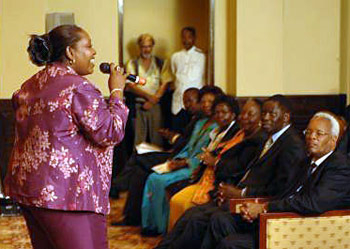News
Pop Star Lends Her Voice to Stop Maternal, Infant and Child Deaths
- 11 June 2007
News
DAR ES SALAAM, Tanzania – When Stara Thomas’s parents christened her after her grandmother 29 years ago, they had no idea how prophetic that name would be. Today, Stara is a singing powerhouse known throughout Swahili-speaking Africa.
But pop super stardom was not enough for this young singing sensation, who started singing at age seven. She decided to lend her voice to help end maternal and child mortality in her home country of Tanzania and around the continent.

“In our country there is joy; in our country there is peace; in our country there is hope, but we still need to protect the women and the children, because their health is our future,” Stara explained from her home in Dar es Salaam, surrounded by her children Nicole, 6, and Jazz, 17 months. “So many mothers suffer. So many children are left to suffer. Yes, our women and children suffer. They have a right to speak out, and they have a right to be heard so everybody must pay attention.”
Stara, who was voted ‘Best Female Vocalist of 2003’, was approached by the White Ribbon Alliance for Safe Motherhood in Tanzania to write and perform a song about promoting safe motherhood and infant health. That song, originally performed in Swahili and later translated into English, became the hit 'Play your Part'. It is also used as the soundtrack for a video of the same name that gives voice to mothers, midwives and children in Tanzania, created with support from the White Ribbon Alliance for Safe Motherhood.
“The song talks about how a pregnant woman’s health is supposed to be taken care of by specialists in order to reduce the number of women and children dying during the delivery time,” Stara says. “I love all women and all children, and I’m sorry for those who have lost their mothers or their sisters. I am together with them.”
Rose Mlay is the Coordinator of the White Ribbon Alliance. She believes that creative solutions like Stara’s song are key to reaching communities and ultimately reducing maternal and infant mortality in Tanzania, where the maternal mortality rate is 578 deaths per 100,000 live births and the infant mortality rate is 68 deaths per 1,000 live births according to the government figures collected through a Demographic and Health Survey in 2004-2005. About 57 per cent of pregnant women in the country deliver at home without a skilled birth attendant.
“We need to join our efforts to advocate and reduce maternal, newborn and child morbidity and mortality in Tanzania,” Ms. Mlay says. “We need this partnership to fight this silent, public tragedy.”
Stara says that she hopes that her song will help motivate the Tanzanian Government to increase the number of midwives to assist women giving birth, as well as mobilize communities.
"I am a mother, and I’ve been in labour, and I know how risky it is,” says Stara, dressed traditionally in an orange gown with a gold sunburst embroidered along the bodice, matching her sunny disposition. “Because I am a singer, and here in my country I am a star, I believe if I speak out, some people will hear me and will listen to my words and even sometimes follow them. If they follow, it can change the world.”
The efforts being made in Tanzania are part of a larger global campaign by the Partnership for Maternal, Newborn and Child Health, consisting of more than 120 members representing partner countries, UN agencies, including UNFPA, the United Nations Population Fund, NGOs, health professional associations, bilateral donors, foundations and academic and research institutions from around the world.
The Partnership is dedicated to achieving Millennium Development Goals (MDGs) 4 and 5 to reduce child mortality by two thirds and maternal mortality by three quarters by 2015.
Last month, more than 300 delegates gathered in Dar es Salaam for the first-ever Partnership forum. At that meeting, the Prime Minister of Tanzania, the Right Honourable Edward N Lowassa, called on regional governments to increase health spending to 15 percent of national budgets in order to meet MDGs 4 and 5.
Almost 90 per cent of all births occur in 75 countries in Africa, Asia and Latin America, which account for more than 75 per cent of the world’s population. Sadly, these countries also make up almost 95 per cent of maternal and newborn deaths annually. Africa accounts for 33 per cent of maternal, 28 per cent of newborn and 43 per cent of child mortality worldwide.
“At the moment of birth, that’s when most of the deaths happen – at birth and just after birth. We need skilled attendants at birth to be able to detect problems and make referrals to emergency obstetric care if needed,” Arletty Pinel, Chief of the Reproductive Health Branch of UNFPA, said during the Partnership meeting. “Maternal deaths are not normal events. Women die because something goes wrong. Most women die, because they don’t have access to life saving measures.”
“Children need their mothers alive, and mothers need their children alive,” she continued. “One woman dies every minute from giving birth around the world. If one woman’s death a minute is not enough for urgent action, I don’t know what is."
-- Angela Walker